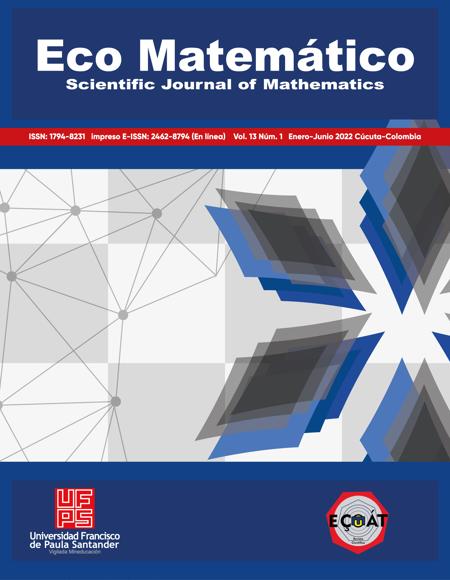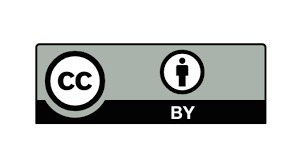Patterns of collective argumentation in mathematics class
Patrones de argumentación colectiva en clase de matemáticas
Main Article Content
Mathematical competencies in school activity, difficulties in strategies that allow their development and how to put them into practice in the classroom has been a study trend. Thus, the collective argumentation and the argumentation patterns are the constitutive elements of the conceptual framework of the research that is presented in this article. The objective was to characterize the patterns of collective argumentation evidenced by the teacher in the classroom to promote argumentation as mathematical competence. The methodology followed a qualitative approach, developed in three stages and using Toulmin's argumentative model as a tool to reconstruct the arguments made in class, information was collected from the classroom planning and with non-participant observation on the videos of several sessions of classes of two mathematics teachers from official elementary and middle school institutions in the Colombian Caribbean region, who constituted the sample under study. The results showed some episodes of collective argumentation used by teachers for this purpose. Concluding that the pattern most used by teachers is the funnel pattern and the combination between this and the provocation pattern to promote collective argumentation in the classroom, the need for conceptual foundations that give rise to a mathematical discourse is also concluded. sustained, consistent and consistent from which the concept of collective argumentation competence in mathematics class can be built, individually and collectively.
Downloads
Article Details
Alsina, Á., García, M., y Torrent, E. La evaluación de la competencia matemática desde la escuela y para la escuela. Union, 55(85)-108.
Arzola, D. (2019). Procesos formativos en la investigación educativa. Chihuahua AC: Chihuahua, México: Red de Investigadores Educativos
Barwell, R. (2016). Formal and informal mathematical discourses: Bakhtin and Vygotsky, dialogue and dialectic. Educational Studies in
Mathematics, 92, 331–345. doi:https://doi.org/10.1007/s10649-015-9641-z DOI: https://doi.org/10.1007/s10649-015-9641-z
Cervantes-Barraza, J., Cabañas-Sánchez, G. y Ordoñez-Cuastumal, S.(2017). El Poder Persuasivo de la Refutación en Argumentaciones
Colectivas. Bolema, 31(59), 861- 879. doi:http://dx.doi.org/10.1590/1980-4415v31n59a01 DOI: https://doi.org/10.1590/1980-4415v31n59a01
Cervantes-Barraza, J., y Cabañas-Sánchez, G. (2018). Argumentos formales y visuales en clase de geometría a nivel primaria. Educación Matemática, 30(1), 163-183. doi:10.24844/EM3001.06 DOI: https://doi.org/10.24844/EM3001.06
Cervantes-Barraza, J., y Cabañas-Sánchez, G. (2020). Teacher promoting student mathematical arguments through questions. En Inprasitha, M., Changsri, N. & Boonsena, N. (s). . Proceedings of the 44th Conference of the International Group for the Psychology of Mathematics Education, (págs. 81-89). Khon Kaen, Thailand.
Cervantes-Barraza, J., Cabañas-Sánchez , G., & Porras, K. (2020). El rol del profesor en la construcción de conocimiento matemático a través de la argumentación colectiva. Tendencias en la educación matemática basada en la investigación, Volumen 4. Puebla, México.
Chávez Vescance, J., y Caicedo Tamayo, A. (2014). TIC y argumentación: Análisis de tareas propuestas por docentes universitarios. Estudios Pedagógicos XL,, 40(2), 83-100. DOI: https://doi.org/10.4067/S0718-07052014000300005
Creswell, J. (2013). Investigación Cualitativa y Diseño Investigativo. Housand Oaks, CA, EE. UU. SAGE.
De Gamboa, G., Núria, P., y Edo, M. (2010). Argumentación matemática: prácticas escritas e interpretaciones. (D. d. experimentales, Ed.) Suma64(35)-44.
Gallego Ramírez, D. C. (2012). Enseñanza por competencias para un aprendizaje significativo en matemática. (E. d. ciencias, Ed.) Repositorio institucional UN, 1-65. doi:https://repositorio.unal.edu.co/handle/unal/9045
Goizueta, M., y Planas, N. (2013). Temas emergentes del análisis de interpretaciones del profesorado sobre la argumentación en clase de matemáticas. Enseñanza de las ciencias: revista de investigación y experiencias didácticas, 31(1), 61-78. doi:https://www.raco.cat/index.php/Ensenanza/article/view/285704 DOI: https://doi.org/10.5565/rev/ec/v31n1.835
Inglis, M., Mejía-Ramos, J. y Simpson, A. (2007). Modelling Mathematical Argumentation: The Importance of Qualification. Educational Studies in Mathematics. 3-21. DOI: https://doi.org/10.1007/s10649-006-9059-8
Jiménez, V. y Comet, C. (2016). Los estudios de casos como enfoque metodológico. ACADEMO Revista de Investigación en Ciencias Sociales y Humanidades.
MEN (2006). Estándares Básicas de Competencias en Matemáticas.
OCDE (2005). La definición y selección de competencias clave. Resumen ejecutivo. Recuperado el 19 de 07 de 2020, de www.OECD.org/edu/statistics/deseco
Rasse, C., y Solar, H. (2019). ¿Quién tiene una respuesta diferente? Análisis del rol docente durante la argumentación en la clase de matemática. Revista iberoamericana de eduación matemática.
Reid, D., Knipping, K., y Crosby.N. (2011). Refutations and the logic of practice. PNA, 1-10. DOI: https://doi.org/10.30827/pna.v6i1.6148
Restrepo Becerra, J. (2017). Concepciones sobre competencias matematicas en profesores de educación básica, media y superior. Boletín redipe, 6(2), 1-15.
Solar, H. y Deulofeu, J. (2016). Condiciones para promover el desarrollo de la competencia de argumentación en el aula de matemáticas. Boleman.
Solar, H. (2018). Implicaciones de la argumentación en el aula de matemáticas. Revista colombiana de educacion, 155-176. DOI: https://doi.org/10.17227/rce.num74-6902
Solar, H. C., y Deulofeu, J. (2016). Condiciones para promover el desarrollo de la competencia de mentación en el aula de matemáticas. Bolema, 30(56), 1092 - 1112,. doi:http://dx.doi.org/10.1590/1980-4415v30n56a13 DOI: https://doi.org/10.1590/1980-4415v30n56a13
Toulmin, S. E. (2007). Los uso de la argumentación. Barcelona: Ediciones península.
Valbuena-Duarte, S., Muñiz-Márquez, L, & Berrio-Valbuena, J. D. (2020). El rol del docente en la argumentación matemática de estudiantes para la resolución de problemas. Espacios, 41(9), 15-29.
Voigt, J. (1995). Thematic patterns of interaction and sociomathematical norms. The emergence of mathematical meaning, 163-201. Obtenido de Lawrence Erlbaum Associates. Hillside, NJ.
Wood, T. (1998). Alternative patterns of communication in mathematics classes:Funneling or focusing? Language and communication in the mathematics classroom , 167-178. Obtenido de National Council of Teachers of Mathematics. Reston, VA.




 Perfil Google Scholar
Perfil Google Scholar



